|
|
|
Sort Order |
|
|
|
Items / Page
|
|
|
|
|
|
|
| Srl | Item |
| 1 |
ID:
006198
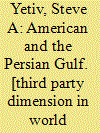

|
|
|
|
|
| Publication |
Westport, Praeger Publishers, 1995.
|
| Description |
x,180p., tables
|
| Standard Number |
0725949737
|
|
|
|
|
|
|
|
|
|
|
|
Copies: C:1/I:0,R:0,Q:0
Circulation
| Accession# | Call# | Current Location | Status | Policy | Location |
| 037726 | 327.73056/YET 037726 | Main | On Shelf | General | |
|
|
|
|
| 2 |
ID:
080591
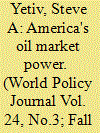

|
|
|
| 3 |
ID:
106086


|
|
|
| 4 |
ID:
076559
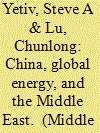

|
|
|
| 5 |
ID:
054645
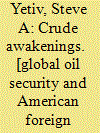

|
|
|
|
|
| Publication |
Ithaca, Cornell University Press, 2004.
|
| Description |
viii, 239p.
|
| Standard Number |
0801442680
|
|
|
|
|
|
|
|
|
|
|
|
Copies: C:1/I:0,R:0,Q:0
Circulation
| Accession# | Call# | Current Location | Status | Policy | Location |
| 048834 | 327.7305609045/YET 048834 | Main | On Shelf | General | |
|
|
|
|
| 6 |
ID:
111115


|
|
|
|
|
| Publication |
2011.
|
| Summary/Abstract |
On 16 December 1907 President Teddy Roosevelt launched the deployment
of sixteen brand-new, glistening white, steam-powered battleships on a
fourteen-month circumnavigation of the globe.
1
Later known as the "Great
White Fleet," the armada demonstrated America's new ability to project its
power abroad and represented a turning point in global power politics. The
cruise is still widely recognized as an important achievement for the U.S. Navy.
In the century since then, in which the United States has emerged as the world's
sole superpower, its navy has made some strides in transforming itself for the
purpose of dealing with new and emerging global threats. It continues to face
such challenges, and it remains to be seen how effective it will be with its ongoing transformation.
|
|
|
|
|
|
|
|
|
|
|
|
|
|
|
|
| 7 |
ID:
142922


|
|
|
|
|
| Summary/Abstract |
There is a sizable gulf of perception between many in America and many in the Muslim world. One broad notion is that America seeks to dominate locals in the Middle East, and to exploit and even steal the region's oil resources. Tins notion has not been limited to jihadi radicals but has also resonated in lesser doses among many in the Muslim world. The U.S. role in oil-related issues feeds into historical, political, and religious perspectives of an imperialist and power-hungry America.
|
|
|
|
|
|
|
|
|
|
|
|
|
|
|
|
| 8 |
ID:
140501


|
|
|
|
|
| Publication |
Oxford, Oxford University Press, 2015.
|
| Description |
xii, 257p.: figureshbk
|
| Standard Number |
9780190212698
|
|
|
|
|
|
|
|
|
|
|
|
Copies: C:1/I:0,R:0,Q:0
Circulation
| Accession# | Call# | Current Location | Status | Policy | Location |
| 058287 | 338.272820973/YET 058287 | Main | On Shelf | General | |
|
|
|
|
| 9 |
ID:
106110


|
|
|
| 10 |
ID:
000976


|
|
|
|
|
| Publication |
Westport, Greenwood Press, 1997.
|
| Description |
xxi, 197p.hbk
|
| Series |
Greenwood Press Guide to Historic Events of the Twentieth Century
|
| Standard Number |
0313299439
|
|
|
|
|
|
|
|
|
|
|
|
Copies: C:1/I:0,R:0,Q:0
Circulation
| Accession# | Call# | Current Location | Status | Policy | Location |
| 040424 | 956.70442/YET 040424 | Main | On Shelf | General | |
|
|
|
|
| 11 |
ID:
122166
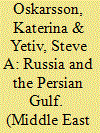

|
|
|
|
|
| Publication |
2013.
|
| Summary/Abstract |
This article examines changes in Russia's diplomatic, trade, and energy relations in the Persian Gulf over time. Our data suggest that Russia's profile in the Persian Gulf is rising in the post-Cold War period. While Russian-Gulf state trade has not reached high levels, trade and energy cooperation have increased significantly. These changes do not mean that Russia has jettisoned strategic interests in the Middle East writ large - as its support of Syria, or to some extent Iran, may indicate - or that it no longer seeks to balance against Washington. But it appears that in the mix of its foreign policy motivations, trade and commerce with Arab Gulf states matter much more now than they did in the past. Should such ties continue to strengthen, they may give Russia greater reason to cooperate with Arab Gulf states on contentious regional issues.
|
|
|
|
|
|
|
|
|
|
|
|
|
|
|
|
| 12 |
ID:
078765
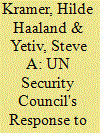

|
|
|
|
|
| Publication |
2007.
|
| Summary/Abstract |
Hilde Haaland Kramer and Steve A. Yetiv argue that the UN Security Council's response to global terrorism has been more forceful and comprehensive since September 11 and that it has broken some new ground. The authors posit that although the UN remains controversial in the United States, Washington benefited from its response to September 11, as imperfect as it was
|
|
|
|
|
|
|
|
|
|
|
|
|
|
|
|
| 13 |
ID:
083629


|
|
|
|
|
| Publication |
2008.
|
| Summary/Abstract |
The showdown with Iran on the nuclear issue may well be one of the most influential crises in the post-cold war era. Prevailing theories of asymmetrical interdependence, the backbone of orthodox understandings of globalization and post-modern cooperation, foster the expectation that Iran should comply with UN demands and stop its uranium enrichment programme. Why is Iran not backing down on its nuclear aspirations, despite its asymmetrical interdependence? In this article, we draw on the neo-liberal insights of R. Harrison Wagner to argue that contrary to conventional assumptions, asymmetrical interdependence is not enough for predicting bargaining outcomes. Rather, it is essential to ask how much the targeted state values the goods that it is being asked to forgo.
Drawing on this central observation, Iran's non-compliance is much easier to explain, as are the most effective courses of action to deal with it. Iran is non-compliant, despite orthodox neo-liberal assumptions, because it values its nuclear options more than the costs being imposed on it, and likely to be further imposed, from non-compliance. This perspective suggests that policies based on manipulation of asymmetrical economic interdependence are unlikely to succeed. Outside actors must change the paradigm of the past 20 years, taking Iran's high resolve into account. The carrot-or-stick package must find carrots that are lucrative enough, and threats that are credible enough, to convey the high costs of non-compliance and the benefits of cooperation.
|
|
|
|
|
|
|
|
|
|
|
|
|
|
|
|
|
|
|
|
|